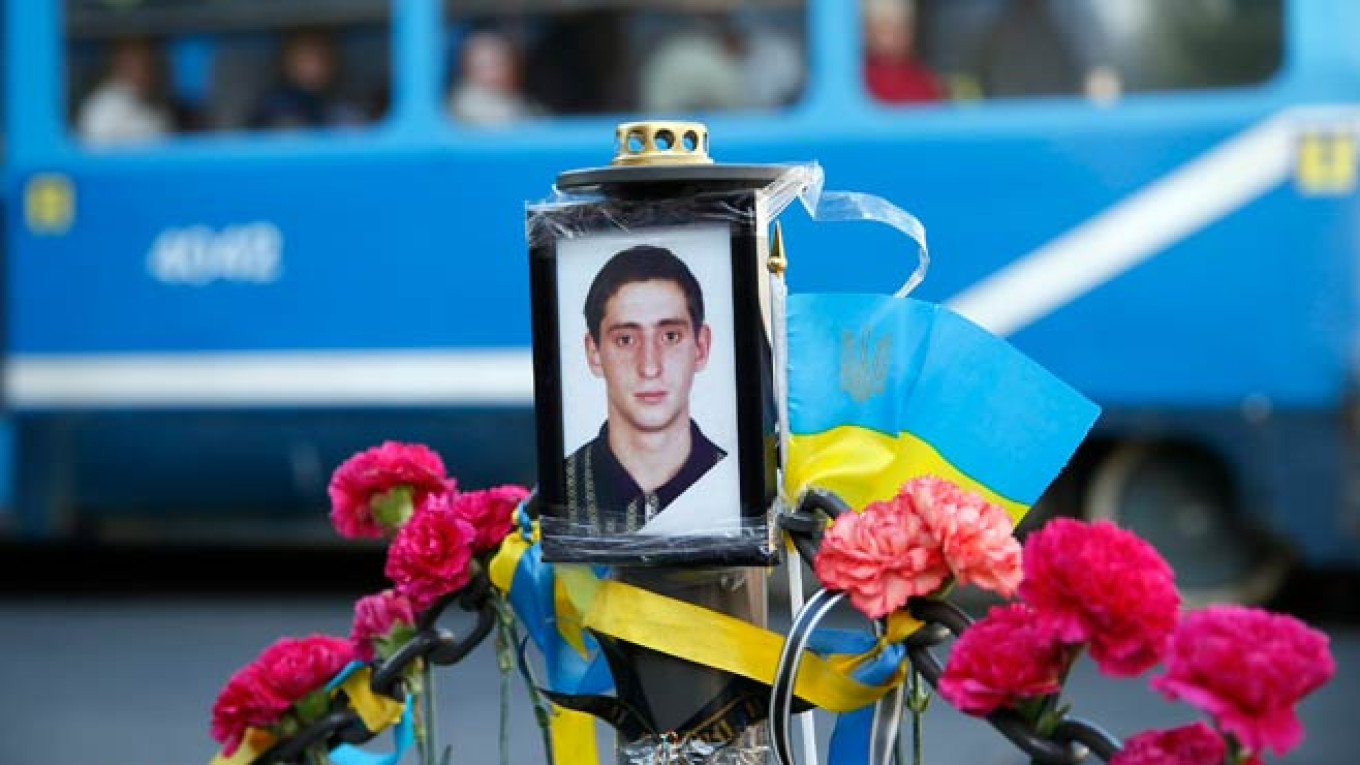Both sides have been burying their dead as Ukraine slides further toward war, with supporters of Russia and of a united Ukraine each accusing the other side of tearing the country apart.
Tuesday morning was quiet in eastern and southern Ukraine, but the deadliest few days since the separatist uprising began have transformed the conflict, hardening positions and leaving little room for peaceful resolution.
In Kramatorsk, a separatist-held town in the east that saw an advance by Ukrainian troops at the weekend, the coffin of 21-year-old nurse Yulia Izotova was carried through streets stilled by barricades of tires and tree trunks. Scattered red carnations traced the route.
At the Holy Trinity Church, seven priests led mourners in prayer for a woman killed by large-caliber bullets, which the townsfolk believe were fired by Ukrainian troops.
"They shoot at us. Why? Because we do not want to live with fascists?" asked 58-year-old passport photographer Sergei Fominsky, standing with his wife among the mourners. "We are not slaves. We kneel to no one."
In Odessa, a previously peaceful, multi-ethnic Black Sea port where more than 40 people were killed on Friday in the worst day of violence since a February revolt toppled Ukraine's pro-Russian president, pall-bearers carried the open casket of Andrei Biryukov from a van to the street corner where he was shot.
A pro-Ukrainian activist, Biryukov, 35, was killed during a day that began with hundreds of pro-Russian sympathizers armed with axes, chains and guns attacking a Ukrainian march, and ended later that night with the pro-Russians barricaded inside a building that was set on fire, killing dozens.
A small crowd of about 50 stood around the body, covering it with carnations and roses. A Ukrainian flag fluttered in the wind, and a patriotic song about dead heroes was played from a sound system.
Relatives wept and a young woman fell on her knees crying loudly. The corner where the man died was decorated with flowers and small Ukrainian flags.
"The government has failed to protect its own people. The police have failed miserably," said Nikita, a grizzled 56-year-old with a Ukrainian yellow and blue armband.
Sergei, in his 40s, who also came to mourn, said violence "was imported to Odessa."
"We were proud of Odessa as a unique place where people used to live in peace, regardless of their beliefs and religion and race," he said. "Now this is all gone."
Government Offensive
The past few days have seen government forces press on with an offensive in the east, where separatist rebels have so far held firm at their main outpost in the town of Slovyansk and shot down three Ukrainian military helicopters.
Interior Minister Arsen Avakov said on Tuesday more than 30 separatists had been killed in fighting around Slovyansk, but there was no confirmation of such a figure. The rebels, who triggered fighting in the area on Monday by ambushing government troops, said four of their number had been killed.
The Ukraine crisis has led to a confrontation between Moscow and the West unseen since the darkest days of the Cold War.
Since a pro-European government took power after the uprising that toppled pro-Russian President Viktor Yanukovych in February, President Vladimir Putin overturned decades of diplomacy by declaring Moscow's right to intervene to protect Russian speakers in the neighboring former Soviet republic.
In March, Russia seized and annexed Ukraine's Crimea region, and in the weeks that followed, armed separatists have taken control of most of the eastern Donbass coal and steel region, which accounts for about 15 percent of Ukraine's population and a third of industrial output.
Moscow has tens of thousands of troops massed on Ukraine's eastern frontier. The outbreak of violence in Odessa, hundreds of kilometers away, near a Russian-occupied breakaway region of neighboring Moldova, means the unrest has spread across the breadth of southern and eastern Ukraine.
Western countries say Russian agents are directing the uprising and Moscow is stoking the violence with a campaign of propaganda, beamed into Ukraine on Russian state channels, that depicts the government in Kiev as "fascists."
"Russia sometimes sounds as if it is refighting World War II. Fascism all over the place. Enemies everywhere. Ghosts of history mobilized," tweeted Swedish Foreign Minister Carl Bildt.
Germany struck an even more ominous note.
A Message from The Moscow Times:
Dear readers,
We are facing unprecedented challenges. Russia's Prosecutor General's Office has designated The Moscow Times as an "undesirable" organization, criminalizing our work and putting our staff at risk of prosecution. This follows our earlier unjust labeling as a "foreign agent."
These actions are direct attempts to silence independent journalism in Russia. The authorities claim our work "discredits the decisions of the Russian leadership." We see things differently: we strive to provide accurate, unbiased reporting on Russia.
We, the journalists of The Moscow Times, refuse to be silenced. But to continue our work, we need your help.
Your support, no matter how small, makes a world of difference. If you can, please support us monthly starting from just $2. It's quick to set up, and every contribution makes a significant impact.
By supporting The Moscow Times, you're defending open, independent journalism in the face of repression. Thank you for standing with us.
Remind me later.


